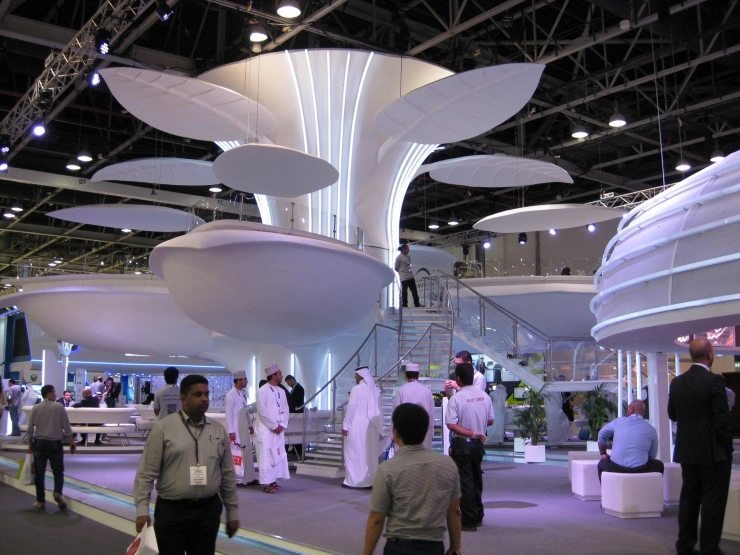
Lei Feng network press: This article comes from Arabian Supply Chain, by Lei Feng network (search "Lei Feng network" public number attention) exclusive compilation, refused to reprint without permission!
Recently, GITEX Technology Week had a perfect curtain in Dubai. Global corporate growth consulting company Frost & Sullivan (Sullivan) made a report on the robot industry at the conference and looked forward to the future of the robot.
Sullivan stated:
By 2020, the number of mobile robots will increase by 6 times than today, which will greatly promote the development of business productivity in the Middle East and the world, ensure work safety, and improve living standards. The shipment of mobile robots will increase from 4 million in 2012 to 25.4 million in 2020. The fastest growth rate will be in the logistics industry. The number of shipments of logistics-related robots will increase from 1400 in 2012 to 2020. 95000. The fastest absolute growth will be personal and home robots, which will increase from 4 million in 2012 to 25 million in 2020.
In this regard, Paul Clarke, CTO of Ocado, the world's largest online retailer, explained:
With the development of artificial intelligence, robots have become smaller and smaller, and they have become more aware of the world through big data and the Internet of Things. In the future, they will be smarter and more adaptable to the environment. This will create conditions for richer human-computer interaction, higher productivity, safer working environment, and better life.
Paul Clarke presided over the retail section of the GITEX conference last Wednesday and delivered a speech on the topic of “Utilizing the Power of the Tsunami of Science and Technology to Reshape the Future of Online Retailingâ€, demonstrating his views on e-commerce under technological innovation.
Ocado has received more than 200,000 weekly orders in the UK, thanks to the company's use of automated warehouses. Its latest automated warehouse is equipped with thousands of robots. Recently, Ocado has collaborated with several EU universities to develop the SecondHand humanoid robot and plans to put it into the factory by 2020.
Paul Clarke said:
Humanoid robots are crucial for improving work efficiency, especially in high-risk and fast-paced environments. The countries in the Middle East now attach great importance to technological innovation, and more and more robots will enter the factories in the Middle East. And our experience accumulated in the retail industry can also be used in other areas such as medical, entertainment and construction industries.

Sullivan also predicts:
With the increasing degree of factory automation, in the future, a robot can replace 10 workers, which will reduce production costs by 60%.
The European Federation of Robotics, a non-profit organization dedicated to promoting the global robotics industry, predicts:
The robotics industry in the Middle East will take off quickly, especially in the industrial and manufacturing fields.
Simon Andersen, chief information officer of European Federation of Robotics, said:
With the development of artificial intelligence, more and more robots have begun to have their own decision-making capabilities. They can complete tasks on their own, thereby improving work efficiency and ensuring work safety. We are now at a breakthrough in the advancement of human-computer interaction technology. The Gulf Cooperation Council for the Arab States and the United Arab Emirates have great ambitions to make robots change their daily lives. We are confident that we can become a leader in this field.
Robots, drones and 3D printing drive innovationAt this stage, in addition to robots, drones and 3D printing technology have also become important factors in rapidly reducing costs, strengthening technology maturity, and promoting innovation and development.
3D printing has tremendous power. With the rapid development of 3D printers, from industrial manufacturing to the medical industry, all walks of life have undergone earth-shaking changes. PWC forecast:
Globally, the value created by 3D printers and services will increase six-fold, from 2.5 billion U.S. dollars in 2013 to 16.2 billion U.S. dollars in 2018.
3D printing has brought dramatic changes to the retail industry, industry analyst Gartner predicts:
Of the top 10 retailers in the world, at least 7 use 3D printing technology.
John Vary, innovation manager of British department store John Lewis, gave a speech on the company's 3D printing application at the GITEX conference.

At the same time, UAVs have also been more widely used, especially in the transportation of goods over long distances. According to PWC data:
Drones brought in $127 billion in business value. Currently, the three most widely used markets for drones are infrastructure, agriculture, and transportation.
GITEX Startup Action Supports InnovationAt the same time, the conference launched the GITEX Startup, which will support the development of global robotics, drones and 3D printing startups.
Ubisoft startup DigiRobotics launched its Robot CafeBot and self-driving car CarBot at GITEX last year and will present its first VR robot simulator this year.
With the full support of the UAE government, the UAE has become the center of robotics, drones and 3D printing in the Middle East. Recently, Dubai opened the world's first 3D printing office building. At the same time, Dubai 3D Printing Strategy is committed to making Dubai a global hub by 2030. Many government departments will use drones to monitor the safety of roads and seas. In 2017, the UAE will also hold the World Future Sports Games 2017.
Trixie Loh Mirmand, Senior Vice President of Exhibition and Event Management at Dubai World Trade Center stated:
The United Arab Emirates demonstrated a bright future to the world. The theme of the conference was "Re-Imagination". It shows robots, drones and 3D printing manufacturers, early adopters, experts and futurists. Way of the future world. In the future, new ideas will become more and more popular.
Via:Arabian Supply Chain
